Podcast
Questions and Answers
Which option correctly fills the blank: When I was young, I didn't use to eat beans. But now I ______.
Which option correctly fills the blank: When I was young, I didn't use to eat beans. But now I ______.
- eats
- do (correct)
- did
- used
Which option correctly fills the blank: Yesterday, she ______ very tired.
Which option correctly fills the blank: Yesterday, she ______ very tired.
- seemed (correct)
- seem
- seeming
- was seemed
Which option correctly fills the blank: When he was on holiday, he usually ______ late.
Which option correctly fills the blank: When he was on holiday, he usually ______ late.
- stayed
- stays up
- stayed up (correct)
- stay up
Which option correctly fills the blank: I once ______ of my mother as an angel with golden wings.
Which option correctly fills the blank: I once ______ of my mother as an angel with golden wings.
Which option correctly fills the blank: From 2005 to 2010, I ______ as a blacksmith.
Which option correctly fills the blank: From 2005 to 2010, I ______ as a blacksmith.
Which option correctly fills the blank: Once upon a time, there ______ a beautiful princess who lived in a castle.
Which option correctly fills the blank: Once upon a time, there ______ a beautiful princess who lived in a castle.
Flashcards are hidden until you start studying
Study Notes
Verb Tenses and Usage
- Seemed (past tense) indicates a temporary state of feeling or appearance; example: "Yesterday, she seemed very tired."
- Built (past tense) describes an action completed in the past; example: "The pharaohs built pyramids."
- Crossed (past tense) shows completion of an event; relevant date: "Egyptian army crossed the Suez Canal in 1973."
- Did take (question form of past tense) asks about the duration of a past event; example: "How long ago did the plane take to arrive in Cairo?"
- Do (present tense) signifies current habits or actions; example: "I didn’t use to eat beans. But now I do."
Changes in Habits
- Watches (present tense) implies a change in regular behavior; example: "Retal no longer watches movies as she used to."
- Used to (past habitual action) indicates past habits; example: "He used to work hard on the farm."
- No longer (indication of change) shows cessation of a previous activity; example: "Nesma used to work hard on the farm."
Transition Between Tenses
- Like (present tense) reflects current feelings; example: "I like him, but now we are good friends."
- Don’t eat (present tense negative) signifies current dietary changes; example: "I used to like fish, but I don’t eat it now."
Holiday Activities
- Stays up (present tense) denotes habitual actions during holidays; example: "When he is on holiday, he usually stays up late."
- Stayed up (past tense) pertains to past holiday behavior; example: "When he was on holiday, he usually stayed up late."
Sequence of Events
- Saw, had, slept (past tense) illustrate a sequence of actions; example: "First, he saw the film, then he had dinner and afterwards he slept."
Dream Narratives
- Dreamt (past tense) reflects a memory or imagination; example: "I once dreamt of my mother as an angel with golden wings."
Storytelling Elements
- Was, lived (past tense) describe existence in a narrative; example: "Once upon a time, there was a beautiful princess who lived in a castle."
Work Experience
- Worked (past continuous) provides context for previous employment; example: "From 2005 to 2010, I worked as a blacksmith."
Studying That Suits You
Use AI to generate personalized quizzes and flashcards to suit your learning preferences.



